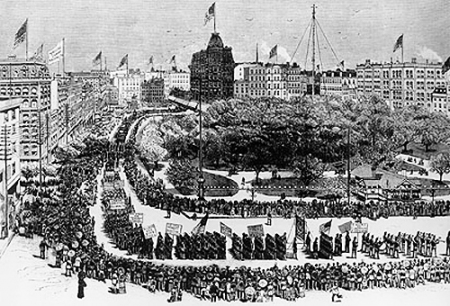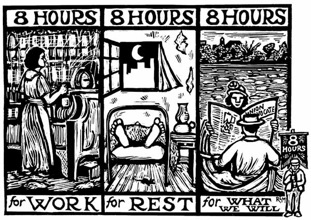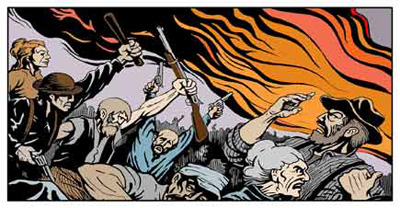|
A common view is that Matthew Maguire, secretary of the Patterson, N.J. local of the International Association of Machinists proposed the holiday for  workers while serving as secretary to the Central Labor Union in New York. workers while serving as secretary to the Central Labor Union in New York.
Debate continues to this day as to who actually originated the idea of a workers' holiday, but organized support came from the Knights of Labor, an workers' organization with nearly a million members by the 1880s. The celebration came at a time when organized labor wanted to demonstrate the strength of their burgeoning movement and inspire improvements in their working conditions.
The Knights held another NYC parade on the first day of September in 1884, designating it as the date to recognize workers every year. Workers of  other organizations across America began to lobby their state and national politicians for legislation declaring the first Monday in September a national holiday. In 1887, Oregon was the first state to designate the date as a legal holiday commemorating labor, followed by Colorado, New Jersey, New York and Massachusetts. By 1894, 31 states had passed legislation honoring workers. other organizations across America began to lobby their state and national politicians for legislation declaring the first Monday in September a national holiday. In 1887, Oregon was the first state to designate the date as a legal holiday commemorating labor, followed by Colorado, New Jersey, New York and Massachusetts. By 1894, 31 states had passed legislation honoring workers.
But in 1894, railway workers went on strike to protest wage cuts and the Pullman Strike crippled the nation's railroad traffic. And in Chicago, two  striking workers died at the hands of US military and US marshals dispatched to end the strike. The labor uprisings against abusive employers was a political nightmare for then President Grover Cleveland and in an effort to appease American workers, legislation sanctioning labor's holiday was rushed through Congress, and on June 28, 1894, Labor Day became a national holiday. striking workers died at the hands of US military and US marshals dispatched to end the strike. The labor uprisings against abusive employers was a political nightmare for then President Grover Cleveland and in an effort to appease American workers, legislation sanctioning labor's holiday was rushed through Congress, and on June 28, 1894, Labor Day became a national holiday.
Still, it wasn't until 1909 that the first Monday in September became a legal holiday in all states except North Dakota and Arizona. In Louisiana, only New Orleans celebrated Labor Day. In Maryland, New Mexico and Wyoming Labor Day was celebrated at the governor's discretion.
“The vital force of labor added materially to the highest standard of living and the greatest production the world has ever known and has brought us closer to the realization of our traditional ideals of economic and political democracy. It is appropriate, therefore, that the nation pay tribute on Labor Day to the creator of so much of the nation's strength, freedom, and leadership – the American worker.” www.dol.gov
|